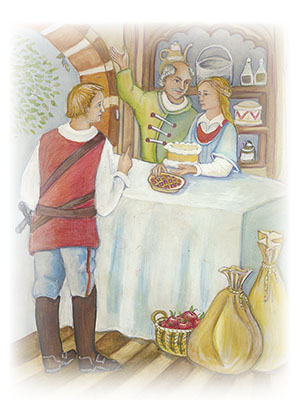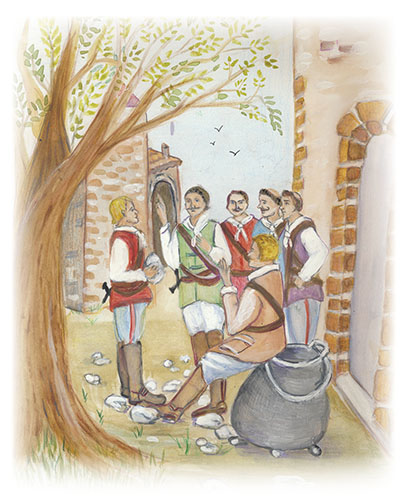The war is over and the soldiers are returning home, not by plane or on horseback, but on foot. Since many share the same origin, they can at least count on each other’s company for the journey. Among them, six Italian soldiers set out for their hometown of Castelmezzano. Their names are Luigi, Bruno, Antonio, Enrico, Luca and Giovanni.
The journey seems unending, and they are tired. But they are such good friends that their jovial companionship eases their hard trek and the post-war privations.
Each night they seek free lodging with some charitable soul. If such they do not find, they have two choices: either to keep walking through the night or to sleep out in the open.
But that is not their only daily challenge: food is also scarce. Some take pity on them and supply provisions for a few days but, when that runs out, they are forced to ask for alms. And unfortunately, not everyone is eager to give.…
This afternoon, they are in a tight spot. The meagre food supply is completely depleted and our soldiers have nothing left to eat. So they decide to split up and ask for help at different points in the city they are passing through.
Luigi enters to a bakery:
“We are soldiers returning from the war. We have been traveling for weeks and still have a long way to go before reaching our homes. Would be kind enough to give us some bread? It would to boost our strength to carry on.”
The baker is unmoved by the soldier’s appeal and remarks coldly:

“We all have our difficulties. Wheat is scarce lately, and that makes it impossible for me offer donations. You won’t be getting any bread from here.”
By the fellow’s attitude, Luigi sees that it would be useless to insist further.
Bruno tries to procure meat at a butcher shop, but the owner apologizes:
“Meat is hard to come by! The plague that came after the conflicts infected even the animals! Healthy livestock has gone down in number, and its price has tripled! How can I give away what it cost me so dearly to get?”
Antonio heads to the fair. The produce booth is well stocked. “I will certainly get a generous donation here,” he imagines. But when he makes his request, the vegetable woman replies:
“I couldn’t possibly! My whole family depends on this business: father, mother, husband, children, brothers, nephews, uncles, cousins… There is nothing I can do to help you! Try with someone else!”
Enrico sets out for the market place, hoping to obtain some choice fruits. However, what he finds is nearly spoiled.
“With a hunger like ours, even this might do,” he reflects. “But there are probably some better samples neatly stowed away” He asks the owner of the establishment, only to hear:
“Yes, I do have good fruit. But I keep it reserved for those who can pay me decently.”
Enrico is stung by the man’s insensitive words, and cannot refrain from retorting:
“Then you can keep your rotten apples!”
And he stomps off.
Luca, with his famous sweet tooth, heads directly to a confectioner’s shop to beg for desserts. “Surely,” he imagines optimistically, “they will be glad to sweeten the bitterness of the battles we fought.” Entering, he explains the situation to the girl behind the counter and asks her to contribute some sweets for their meal.
“Of course we can!” she responds with joy.
But as the young girl begins to select some sweets, her parents, owners of the store, react immediately:
“Maria, what are you doing? Are you going crazy?” scolds the father.
“These sweets were not made to be just given away! Put those back on the shelf this instant! cries the mother.
Sadly, the girl obeys, darting an apologetic look at the disappointed soldier…
Some time later, the six friends meet in the square – each of them empty-handed and famished! They are all crestfallen, but Giovanni, the last to arrive, looks unwilling to admit defeat.
“None of you got anything either?”
“Absolutely nothing! …” they reply in unison.
Then Giovanni goes on:
“This cannot be. These people must be able to help us… Do you know what? We’re not going without food. We’re going to make a delicious soup!”
“What kind of soup?” the others asked. “We don’t even have a grain of rice for the pot.”
“Well, we have water, firewood, fire and… stones!”
“Stones?”
“Yes! We shall make stone soup. Let’s get cooking!”
Giovanni’s persuasive gift of command sets the soldiers in motion, even though they cannot imagine how a soup by that name could possibly be delicious.
It is early evening. The day’s work has come to a close, and peasants and peddlers are all heading home. They necessarily pass by the square where Giovanni and his companions are gathered, and no one fails to be intrigued by the scene: six hungry soldiers gathered around a steaming pot of water.

Among the passers-by are the baker, the butcher, the vegetable woman, the fruit vendor and the confectioner family. Curiously, they approach and ask:
“What are you cooking?”
“Stone soup,” replies one of the soldiers.
“Stones! But will that really work out?”
“Well… some ingredients are missing.”
Their interest piqued, the peddlers inquire:
“What sort of ingredients?”
Each inquirer receives a specially adapted answer. The baker is told that a delicious soup must always be accompanied by good bread; with the butcher, the absence of meat is emphasized; the vegetable woman is reminded that every good stew includes quality vegetables. The fruit vendor and the confectioner family are assured that this particular soup is best followed by a dessert of fine fruits and sweets.
Lo and behold, they all hasten to their shops to fetch their very best contributions for the mysterious dish. And they do so with such bounty that the resulting stew satisfies not only the terrible hunger of six Italian soldiers, but that of the once-selfish donors, as well.
Let us make no mistake: it is always possible to help those in need. People of good will always find some way of serving others, even if they are going through difficult times themselves. Only those who don’t want to give are hasty to refuse. ◊


